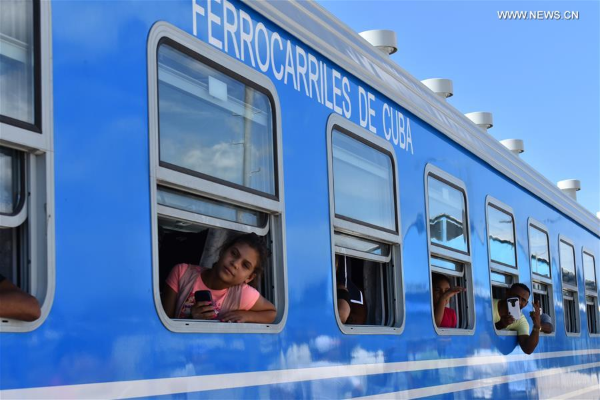



A train made up entirely by Chinese wagons departs from Havana Central Railway Station in Havana, capital of Cuba, July 13, 2019. (Xinhua/Zhu Wanjun)
The first train made up entirely by Chinese wagons began a 14-hour, 835-km journey between Havana and Santiago de Cuba, the second-largest city on the island.
This convoy has 12 wagons recently arriving from China, the first of four convoys to start rolling in the coming days as part of an ambitious program to update the Cuban railway system.
"Thanks to the cooperative relations with China, today the Cuban transport system can count with the start-up of these trains," Marta Oramas, Cuban deputy minister of transport, told Xinhua.
As this service starts, public expectations rose high. Tickets for this first trip to the eastern end of the island have quickly sold out.
In May, the first 80 cars arrived on the island, from a batch of 240 ones to land in Havana at a rate of 80 each year from 2019 to 2021, and acquired with a Chinese loan payable in 15 years.
It was the first time in 44 years that Cuba received new railroad cars. Before, the island bought second-hand wagons. Now, aided by China National Machinery Import & Export Corporation and CRRC Tangshan Co., Ltd., the Caribbean nation under a U.S. trade embargo gets truly able to renovate its trains.
"Undoubtedly this service will transform the transportation of passengers in the country," said Eduardo Hernandez, director of the Railways Union of Cuba (UFC)。 "With the support of these trains we will improve the service for the whole country."
Next year it will be possible to carry a million passengers, Hernandez said.
With the first 80 cars, the UFC expects to make up four trains each of 12 wagons, almost twice the current formation with seven old wagons. They will have first-class cars with air conditioning and television, and second-class ones with fans and windows.
Each wagon has a seating capacity of 72. Altogether they offer room for 720 passengers in a railway formation about 325 meters long, something unusual on the island.
Just as the new trains began services, summer vacations come when more people travel on the island. New cars will allow reducing travel times by, as estimated, two to three hours.
Passing through Santiago de Cuba, the new trains will get to Guantanamo on the eastern end of the island, allowing the recovery of a line of 733 km abandoned since 2006 between Havana and Holguin, also in the east.